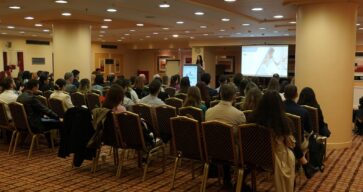Innovative on-patent medicines
In the pharmaceutical sector, the future cannot wait: every day, thousands of scientists around the world are working out tomorrow’s cures to human diseases and are changing the lives of millions of people and their families. Being the fruit of a continuous and painstaking process that requires huge investment, originator medicines are vital weapons in the arsenal of physicians in their search for the most appropriate treatment for their patients. Due to the uniqueness of their production process and, most importantly, their therapeutic efficacy, on-patent medicines hold a special position among pharmaceuticals; also, as they become less costly once their patent expires, they contribute to savings on health expenditure.
With the value of uniqueness
Pharmaceutical preparations, notably innovative ones, are the most powerful weapon available to the medical community in its continuous battle against diseases.
On-patent medicines, as these innovative medicinal products are called, are the fruits of research, developed through heavy investment in R&D, and are rightly seen as important factors that improve quality of life. At the same time, their cost effectiveness makes them tools that can contribute to economic growth and prosperity in a country. In recent years, the years of recession, economic considerations have become a key parameter in healthcare policy. We therefore believe it is time the State realised that healthcare provision cannot be seen as just another expenditure item, but rather as multi-faceted investment that can boost the national economy, by driving income, expertise, jobs, modernisation and progress, and of course it cannot be distracted from its essential role, which is to defend the right of Greek citizens to a similar level of healthcare as that enjoyed in other developed countries of the world.On-patent medicines are innovative medicinal products developed after years of laboratory and clinical research. Globally, on-patent medicines are subject to strict regulatory standards to ensure their quality, safety and efficacy.
The cost of pharmaceutical and biotechnology research for the discovery of novel medicines is enormous. This is one of the reasons why on-patent medicines are protected by a patent for a period of twenty years after their molecule is developed. However, most of this period, 12 to 13 years, is used up for the necessary scientific and administrative procedures (clinical safety and efficacy studies, dosage, authorisation, pricing, reimbursement classification, etc.) before the new medicinal products becomes accessible to those who need it.
This means that, effectively, a new on-patent medicine placed on the market is protected for 7-8 years until its patent expires, when it is reclassified as “off-patent”.
Furthermore, once the patent expires, it is permitted to place on the market other, substantially similar products (known as generic medicines or generics), which are produced by companies that have not invested in their research. Still, off-patent original medicines always remain the benchmark and point of reference for the corresponding generics.
In the context of the effort to better manage and control pharmaceutical expenditure, governments often adopt strict measures on the pricing of medicines and the conditions for their reimbursement by social security.The prices of original on-patent medicines in Greece are among the lowest in Europe.
In Greece, the prices of all medicines are determined by the Ministry of Health. For originator medicines, pricing is based on the average of the three lowest prices in the member states of the EU-28.
Pharmaceutical spending represents a small portion (about 20%) of public healthcare expenditure.
The latter is subject to a continuous squeeze, despite its excellent cost effectiveness ratio. Indeed, it has been shown that every euro spent on medicines saves 6 euros on other healthcare expenditure!In 1971, the Greek poet and Nobel laureate Giorgos Seferis died in hospital from complications of duodenal ulcer surgery. Just five years later, the first in a long line of revolutionary anti-ulcer medicines was launched, and ulcer surgery became a thing of the past. Today, however, it looks like no-one has thought to subtract the cost of anti-ulcer medicines from the much-talked-about “pharmaceutical expenditure” and weigh it against the huge cost of thousands of surgeries avoided and the benefit from the quality of life enjoyed now by millions of ulcer sufferers.
Throughout the 20th century, innovative medicines played a crucial role in treating a host of serious conditions such as HIV/AIDS, cardiovascular and neuropsychiatric diseases and cancer, giving a longer and better life to millions of people. This research effort has continued unabated to this day, in fact more recently its scope has been expanded to include treatments for serious and rare diseases, the so-called “orphan drugs”. And of course research as far as still untreated diseases are concerned is not over, but is still ongoing.
Largely thanks to these efforts, Europeans now live 30 years longer than a century ago!
REFERENCES 1. Patent Act, RSC 1985, C. P-4). 2. Law 4052/01.03.2012, Article 21. 3. Government Gazette 1907 B/15.07.2014, Article 1.2.


